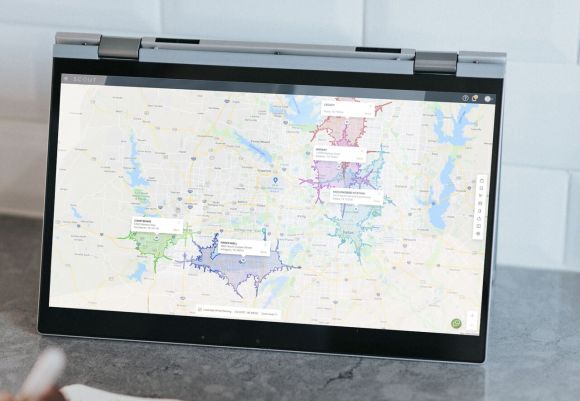In today's highly competitive hospitality industry, hotel chains and management companies are in a race to optimize their networks, pinpoint prime locations for new properties, and decode their customers' preferences. Enter predictive analytics — a game-changer when it comes to market planning and marketing strategy.
Harnessing the power of technology and data analytics, marketing and real estate professionals in the hospitality sector can unlock growth, supercharge their decision-making with data, and revolutionize their brand's performance. In this article, we will explore the significance of predictive analytics in the hospitality sector, highlighting key insights from the “Predictive Analytics for Hospitality” webinar presented by Jack Hall, VP of Strategic Accounts at Buxton.
Assessing Demand Generators and Predicting Performance
One of the key components of site evaluation in the hotel industry is determining a potential location’s demand generators. Predictive analytics allows real estate professionals to assess demand generators in the vicinity of their hotels quickly. The Buxton Platform provides tools to evaluate key attractions, businesses, golf courses, and other crucial factors that influence a property's performance. This analysis helps determine whether a specific market has the required demand generators to support a top-performing hotel. By identifying the specific predictors of performance for various brand and chain scales, decision-makers can gauge a property's potential accurately. This data-driven approach enhances site selection decisions and minimizes the risk of investing in low-demand areas.
Reducing the Risk of Underperforming Hotels
One of the most important objectives among real estate professionals is to reduce the risk of managing or opening underperforming hotels, which can be mitigated through the implementation of predictive analytics. Through in-depth analysis and data-driven tools, real estate teams can gain valuable insights into the future performance of a property. With the Buxton Platform, these teams can identify the business and leisure guests at a granular level, enabling a deeper understanding of customer preferences and behaviors. By understanding customers in addition to accurately identifying demand generators that are most predictive of performance, decision-makers can make informed choices and mitigate risks associated with underperforming hotels.
Opening the Right Brands in the Right Locations
Not only does the Buxton Platform help real estate teams avoid making costly mistakes, it also empowers hotel chains and management companies to open the right brands in the right locations. By utilizing comprehensive data sets and predictive models, it becomes possible to identify emerging markets throughout the United States that possess the key demand generators required for top-performing properties. This enables real estate teams to make strategic decisions based on market potential, optimize their brand portfolio, and avoid mismatches between property type and location. The ability to forecast room night stays and occupancy levels specific to any brand and chain scale enhances decision-making in site evaluation as well.
Understanding the Business and Leisure Traveler
In addition to site optimization and selection, predictive analytics also helps unlock valuable insights about the business and leisure travelers, allowing hoteliers to tailor their marketing strategies and capture the right target audience. The Buxton Platform leverages a wealth of data, including household-level information on 126 million households and business data on millions of businesses. By tying guest devices to their households or originating businesses, marketers gain a precise understanding of their guests' characteristics, preferences, and geographic locations. This knowledge enables them to identify the top originating markets for both business and leisure guests and make data-driven marketing decisions.
Benchmarking and Competitive Insights
Understanding one’s competitors is as important as understanding one’s own customers and location performance. While traditional benchmarking tools like STAR reports provide valuable industry comparisons, the Buxton Platform takes benchmarking to a more granular level. By benchmarking individual properties against specific comp set groupings of nearby hotels, marketers gain a competitive advantage. This individualized insight allows them to understand their property's performance within its immediate competitive landscape. Moreover, the platform offers valuable intelligence on independent hotels that is not accessible through STAR reports. This detailed benchmarking empowers marketers to refine their marketing strategies and stay ahead of the competition.
Optimizing Marketing Spends
Another advantage of predictive analytics is its ability to optimize marketing spends. With the Buxton Platform, marketers can identify the top ZIP codes in the originating markets with the highest counts of potential guests. This enables them to focus their marketing efforts and resources efficiently, directing marketing budgets towards areas with the highest potential return on investment. By targeting specific ZIP codes that attract a significant number of potential guests, marketers can optimize their marketing campaigns, social media buys, and search term investments.
Conclusion
Predictive analytics powered by the Buxton Platform provides hospitality marketers and real estate teams with invaluable tools and insights to grow their hotel brands. By leveraging the platform's advanced analytics capabilities, industry professionals can reduce the risk of underperforming hotels, open the right brands in optimal locations, and gain a deep understanding of their consumer travelers. The ability to assess demand generators, predict performance, benchmark against competitors, and optimize marketing spends gives hotel chains and management companies a significant competitive edge in a crowded marketplace. With data-driven decision-making at the core of their strategies, hospitality businesses can drive growth, enhance customer experiences, and stay ahead of the competition.
Listen to the full webinar here: Predictive Analytics for Hospitality


